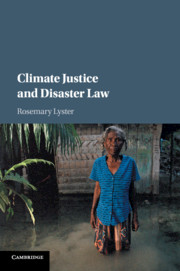Crossref Citations
This Book has been
cited by the following publications. This list is generated based on data provided by Crossref.
2017.
Time and Environmental Law.
p.
264.
Lyster, Rosemary
2017.
Climate justice, adaptation and the Paris Agreement: a recipe for disasters?.
Environmental Politics,
Vol. 26,
Issue. 3,
p.
438.
Adelman, Sam
2018.
Human Rights in the Paris Agreement: Too Little, Too Late?.
Transnational Environmental Law,
Vol. 7,
Issue. 1,
p.
17.
Cooper, Michael D.
2019.
The Cambridge Handbook of Disaster Risk Reduction and International Law.
p.
17.
Setzer, Joana
and
Vanhala, Lisa C.
2019.
Climate change litigation: A review of research on courts and litigants in climate governance.
WIREs Climate Change,
Vol. 10,
Issue. 3,
Wenta, Joseph
McDonald, Jan
and
McGee, Jeffrey S.
2019.
Enhancing Resilience and Justice in Climate Adaptation Laws.
Transnational Environmental Law,
Vol. 8,
Issue. 1,
p.
89.
2019.
Highlights of Recent Book Publications (August 2018 to July 2019).
Transnational Environmental Law,
Vol. 8,
Issue. 3,
p.
589.
Dehm, Julia
2020.
Climate change, ‘slow violence’ and the indefinite deferral of responsibility for ‘loss and damage’.
Griffith Law Review,
Vol. 29,
Issue. 2,
p.
220.
O’Donnell, Tayanah
2020.
Natural Hazards and Disaster Justice.
p.
117.
McDonald, Jan
and
McCormack, Phillipa C.
2021.
Rethinking the role of law in adapting to climate change.
WIREs Climate Change,
Vol. 12,
Issue. 5,
Cassotta, Sandra
2021.
Ocean Acidification in the Arctic in a Multi-Regulatory, Climate Justice Perspective.
Frontiers in Climate,
Vol. 3,
Issue. ,
Yadin, Sharon
2023.
Fighting Climate Change through Shaming.
De Vido, Sara
and
Fornalé, Elisa
2023.
Women’s Empowerment and Its Limits.
p.
33.





